The Antiplanner was in Spokane yesterday where the local transit agency is asking voters for a 50 percent increase in the sales tax that funds most of the agency’s operations. Much of the new money will go for various capital projects that will do little to increase ridership.

$1.2 million will buy you a bus that can go 170 miles on a single charge of batteries. The bus has 60 seats, which is just what is needed in Spokane, where the average bus carries just 9 people.
Spokane Transit previously persuaded voters to double the sales tax in 2004. The improvements made with that money led to a small increase in per capita transit ridership from about 25 trips per person per year to 27. Based on this, it doesn’t seem likely that another 50 percent increase in funding will do much to boost ridership.
In a presentation (13 megabytes), the Antiplanner argued that the agency could provide better service with no tax increase if it purchased conventional buses rather than electric ones and used shared infrastructure (streets) rather than dedicated infrastructure (such as expensive battery-charging facilities). If you prefer PDF format, you can download a 9.5-megabyte version here.
CBT combined with behavior therapy usually has the best chance of cialis generika success. There are many complications faced at the time of ED patients the power should be used more than once during the period. 6) In case of any health issues then the dose is adjusted as per the instructions viagra online prescription of the health expert. The first one is obviously related to medication. canadian viagra http://appalachianmagazine.com/invite-the-travel-bloggers/ This is a very effective treatment generic viagra for woman and it will also quicken the aging process.
Unfortunately, federal incentives lead transit agencies to costly alternatives. For example, the feds will fund 80 percent of a conventional bus but 90 percent of a “clean” bus, thus leading agencies to buy extremely expensive buses that actually produce little environmental benefit (especially if the conventional bus is fueled with biodiesel). In particular, Spokane Transit proposes to buy 60-foot, battery-powered buses that will cost $1.2 million–twice the cost of ordinary 60-foot buses (about $540,000) and well over three times the cost of standard, 40-foot buses (about $380,000).
In other words, they want to buy the Tesla of buses. Teslas are fine for wealthy people who want to flaunt their riches or be an early adaptor of new technologies. But government agencies shouldn’t use tax dollars to buy such things, especially when fueling ordinary buses with biodiesel produces about the same environmental benefits at a far lower cost.
In addition, the “Small Starts” program that provides up to $75 million for capital-intensive transit improvements has led Spokane to design a new transit line mainly to get the grant, not to provide better service. Even so, I suspect the project Spokane Transit is proposing, which would use the battery-powered buses on a six-mile loop through the center of the city, doesn’t meet Small Start guidelines. If not, it will probably just come up with some other absurd design. If voters approve the tax increase, Spokane Transit will probably end up with so much money it will start seriously thinking about a streetcar instead of a battery-powered bus.
Over the past seven years, transit fares have covered just 14 percent of Spokane Transit’s costs. That means the agency must give about 14 percent of its attention to pleasing riders and 86 percent of its efforts to convincing voters and appropriators that it provides some vital service to the community.
In fact, it doesn’t. The Antiplanner pointed out that just 2.8 percent of Spokane workers live in households with no cars, and 45 percent of them nevertheless drive along to work while just 38 percent take transit, suggesting the transit doesn’t even work for most people who don’t have cars. This is one more case of a transit agency that has too much money and it is using that money to do foolish things like focus on fixed infrastructure rather than operating an efficient bus system.







